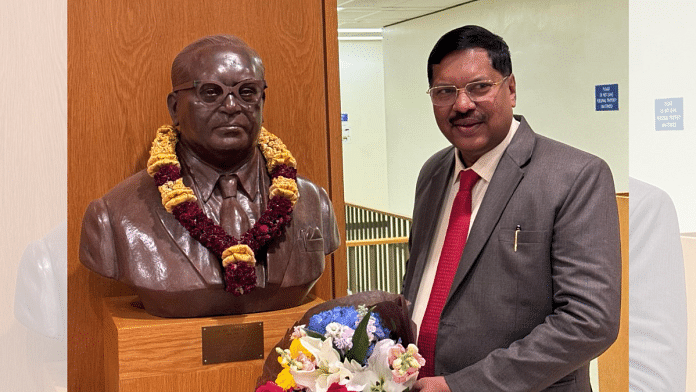New Delhi: India’s Constitution is evidence of the country’s transformation from colonialism to democracy, Supreme Court Justice B.R. Gavai told an audience in New York’s Columbia University Tuesday, as he delivered a lecture and paid homage to a bust of the document’s chief architect Dr B.R Ambedkar.
Delivering a lecture on “75 Years of Transformative Constitutionalism”, Justice Gavai pointed out that Ambedkar had completed his MA and doctorate from Columbia, which later installed his sculpture as a tribute.
He said the Indian Constitution reflected a “transformative intent”, and underscored the role of the Supreme Court, which he said, had to “act as the custodian of the Constitution and the ultimate arbiter of justice”.
In his speech, the justice said the “historical narrative of the Indian Constitution is marked by a shift from an unequal society rotted by social division and injustice and subsequent colonial regime to one that upholds justice, equality, liberty, and the individual dignity of all”.
The Constitution, he said, “is evidence of the transformation of the governance structure in India from colonialism to democracy” and from the “order of the Queen” to the “will of the people”.
He said while democracy needed to be protected and upheld at all times by the people, the courts played a seminal role in reinforcing the supremacy of the Constitution and determining the validity of legislative and executive actions on the principles of the Constitution.
Gavai also cited the Supreme Court’s judgment from March last year, when a five-judge Constitution Bench modified the process of appointing members of the Election Commission of India (ECI).
The court held that a committee comprising the Prime Minister, the leader of the Opposition and the Chief Justice of India (CJI) would advise the President on ECI appointments. Referring to this judgment, Justice Gavai said the SC has repeatedly stressed on free and fair participation of voters in the electoral process.
In December, however, the government passed a law that negated the top court’s verdict by replacing the CJI with a Cabinet minister. The Supreme Court is currently hearing a challenge to this new law.
Justice Gavai also spoke on the Supreme Court judgment scrapping electoral bonds, and said, “The expansion of the freedom to speech and expression under Article 19(1)(a) to include the right to information is a crucial recognition for the citizenry to effectively participate in the elections, which, in turn, is an intrinsic feature of democracy.”
Also read: 3 survey results that tell us what Indians think about democracy — and it’s not a simple story
‘Social democracy’
In his speech, Justice Gavai quoted Ambedkar’s last address to the Constituent Assembly, articulating the transformative constitutional vision. Dr Ambedkar had said, “We must make our political democracy a social democracy as well. Political democracy cannot last unless there lies at the base of it social democracy.”
Justice Gavai asserted that over the years, the legislature had enacted pioneering laws to uphold constitutional ideals and secure the rights of vulnerable and marginalised sections of society.
He also gave examples of several such laws. This included the Scheduled Castes and Scheduled Tribes (Prevention of Atrocities) Act 1989, the Prohibition of Employment as Manual Scavengers and their Rehabilitation Act 2013, the Transgender Persons (Protection of Rights) Act 2019, the Child Labour (Prohibition and Regulation) Act 1986, the Prohibition of Child Marriage Act 2006, the Right of Children to Free and Compulsory Education Act 2009, the Rights of Persons with Disabilities Act 2016, and the Scheduled Tribes and Other Traditional Forest Dwellers (Recognition of Forest Rights) Act 2006.
Justice Gavai said the Supreme Court had repeatedly broadened the scope and reach of fundamental rights provisions under Part III of the Constitution.
He explained that the reservation policy or quota in India was the “core of affirmative action, essentially a preferential treatment policy for certain disadvantaged groups”.
“The objective of these policies is to fill in the gaps created by systematic and multifaceted discrimination and to provide equal access to opportunities to marginalised sections of society akin to dominant groups,” he told listeners.
(Edited Tikli Basu)
Also read: Banning electoral bonds won’t cure corporate capture of politics. Bigger reforms are needed



